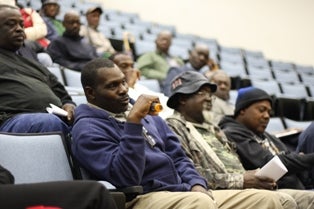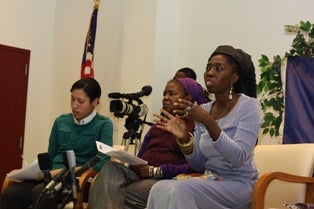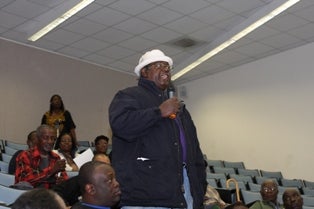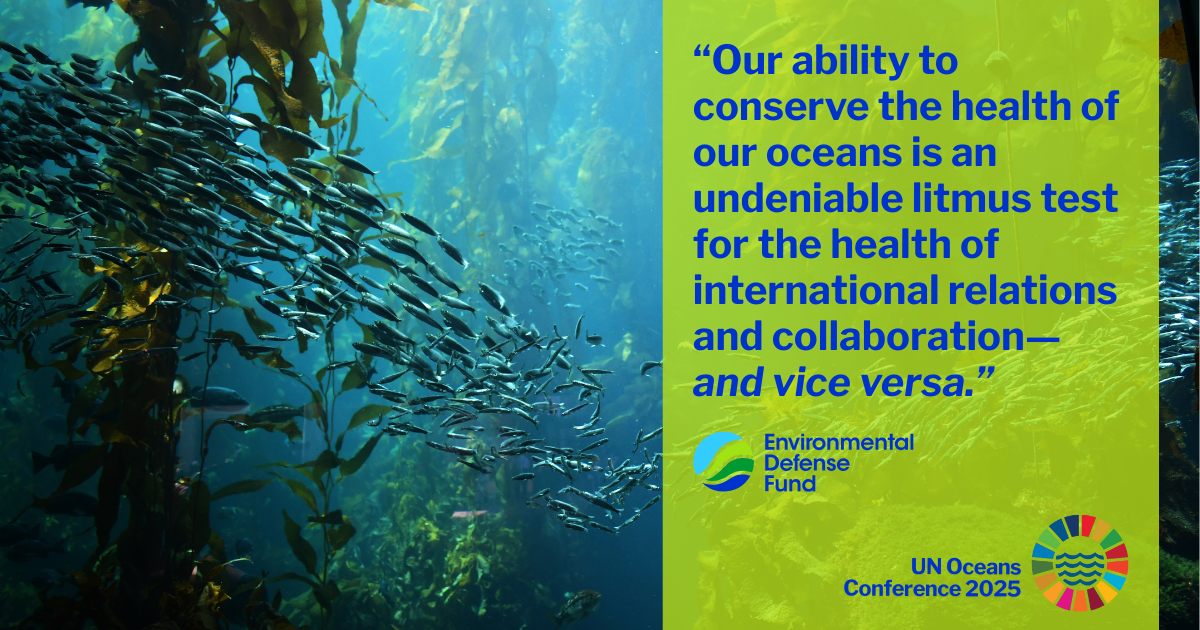Queen Quet, Chieftess of the Gullah/Geechee Nation, and EDF Host Fishermen Listening Session in Beaufort, SC
 The Oceans program has developed robust relationships with an array of people across the U.S. including fishermen, scientists, academics, and political leaders; however, it‘s not every day that it works closely with royalty. Over the past several weeks, the Oceans program has partnered with Queen Quet, Chieftess of the Gullah/Geechee nation, and the organization she founded, the Gullah/Geechee Sea Island Coalition in its effort to engage African-American fishermen in the Southeast – the voices of whom haven’t been apart of the conversation to sustain fisheries.
The Oceans program has developed robust relationships with an array of people across the U.S. including fishermen, scientists, academics, and political leaders; however, it‘s not every day that it works closely with royalty. Over the past several weeks, the Oceans program has partnered with Queen Quet, Chieftess of the Gullah/Geechee nation, and the organization she founded, the Gullah/Geechee Sea Island Coalition in its effort to engage African-American fishermen in the Southeast – the voices of whom haven’t been apart of the conversation to sustain fisheries.
For many years, Queen Quet has diligently championed the conservation of the rich Gullah/Geechee culture and heritage. The Gullah/Geechee is a minority group within the African-American population. Spanning from the coast of Jacksonville, North Carolina to Jacksonville, Florida, the Gullah/Geechee nation has upheld the linguistics and traditions of their West African ancestry. The Gullah/Geechee are a people that have lived off the land and water for over 300 years, and their inherent ties to these resources are pervasive throughout their way of life.
 Because the continuity of this way of life is pertinent for Queen Quet and her people who have fished for generations, she expressed a keen interest in collaborating with EDF to better understand the challenges facing African-Americans for what has been perceived as a changing rate of participation in subsistence and commercial fisheries. To best document the concerns of this community, EDF and the Gullah/Geechee Sea Island Coalition cosponsored a listening session in Beaufort, South Carolina on January 21st. The event was a great achievement and brought together local and state officials and approximately 30 fishermen. For a group that generally has not been present at public forums in the past, this turnout signified the importance of the subject.
Because the continuity of this way of life is pertinent for Queen Quet and her people who have fished for generations, she expressed a keen interest in collaborating with EDF to better understand the challenges facing African-Americans for what has been perceived as a changing rate of participation in subsistence and commercial fisheries. To best document the concerns of this community, EDF and the Gullah/Geechee Sea Island Coalition cosponsored a listening session in Beaufort, South Carolina on January 21st. The event was a great achievement and brought together local and state officials and approximately 30 fishermen. For a group that generally has not been present at public forums in the past, this turnout signified the importance of the subject.
 According to Queen Quet, seafood is one of the major sources of employment for the Gullah/Geechee. During the meeting, the fishermen openly shared their concerns about the fishing industry, drawing comments from nearly everyone in the auditorium throughout the night.
According to Queen Quet, seafood is one of the major sources of employment for the Gullah/Geechee. During the meeting, the fishermen openly shared their concerns about the fishing industry, drawing comments from nearly everyone in the auditorium throughout the night.
The adversities identified by the community included size and catch limit restrictions, limited access to docks and oyster beds, depletion of fish stocks, unawareness of changing regulations and management decisions, and rising costs. These are the type of issues confronted by many of the fishermen with whom EDF works. Although the fishermen looked to EDF to present solutions to the issues identified, they also saw the value in shaping a collective voice. When asked, there was an incredible consensus by the fishermen to form a Black fishermen association encompassing the South Atlantic region.
The information gathered from these sessions will be shared with political leaders such as Jim Clyburn (D-SC) and members of the Congressional Black Caucus to bring awareness to an issue affecting the livelihoods of their constituency and begin to chart a way forward. We intend to proceed with another listening session in North Carolina in April.
As the session concluded, the attendees were interested in keeping this momentum strong and inquired about a follow-up meeting taking place. Needless to say, we were extremely heartened about this great start. We will work to continue to build a strong relationship with this community and help them find solutions to their challenges that will result in sustainable and healthy fisheries.
Nicole Smith is a 2009 – 2010 Oceans Program Fellow working to engage African-American fishermen in the U.S. southeast.













3 Comments
Hi My name is Rhonda Maker, and I live in Kodiak, Ak. I, we have lived with catch shares, IFQs whatever they call them since 1995. I’m here to tell you that is all bad. It gives a public resources to certain individuals bsed on fishing history for the boat owners. i will divide your people , into haves and have nots. You will see an exodous from your community. you will see people struggle to get something, or get nothing, and where do they get the $ to buy in once the fish have been given to others. You will be paying for yourfish years ahead, and your traditions will fade. You will see others buy the fish you used to live off of.EDF is not on your side. They are working for control of the resource because they want them for themselves and thier investors. I wholeheatedly oppose this system. It’s killing our town, and my future. Pls come to the rally in DC, Feb. 24 noon, and listen to the real truth. I’ll be there, and be happy to talk to you anytime. Thank you for your time and consideration, Rhonda Maker, former fisherman , business owner 907 481 3100
I would be interested in hearing this discussion in North Carolina. Do you have any specifics about when and where? I do not think Catch Shares being pushed by the EDF are the way to go for fishing communities who wish to remain fishing communities.
Many African-American fishermen in the Southeast are also concerned with their fishing future. I heard from 30 Gullah-Geechee fishermen last week in South Carolina how increased equipment and fuel costs, limited access, stringent size and catch limits, and declining stocks are making it really hard to make a decent living or simply provide food for their families. But despite the tough outlook these fishermen are hopeful about the future, and they are eager to hear about solutions that can keep their fishing culture alive and strong. This enthusiasm will make all the difference as they think about and discuss new approaches that work for them.
We plan to host another listening session in North Carolina during April. The specifics have not been finalized as of yet, but we will keep you posted once everything is determined.